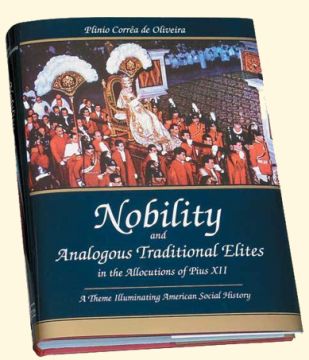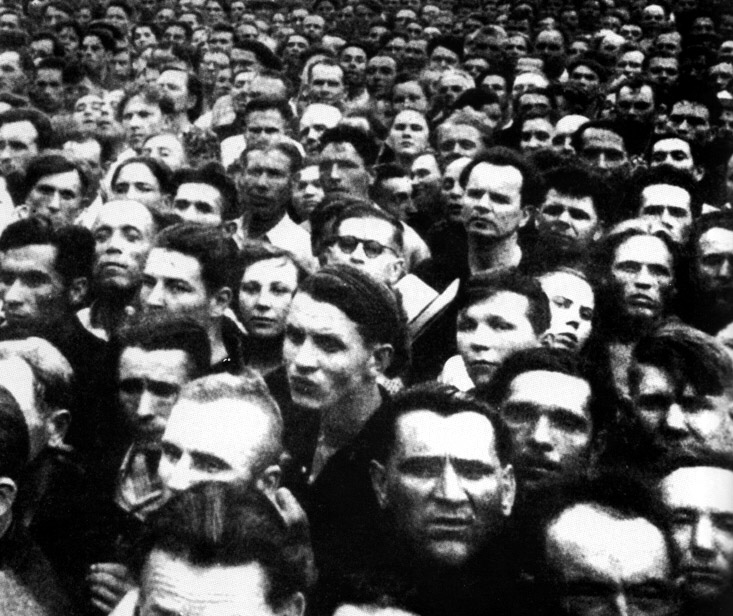|
Plinio Corrêa de Oliveira
Chapter III
|
|
|
Before beginning the study of Pius XII’s allocutions to the Roman Patriciate and Nobility, it seems useful to forestall any shock that the reading of these commentaries may cause in people influenced by today’s radically egalitarian populism. The same shock may also come to others—perhaps even some belonging to the nobility or analogous elites—who fear infuriating the partisans of this populism with the frank and uninhibited assertion of many of the themes articulated in this work. To prevent this, we shall first set forth the true Catholic doctrine on the just and proportioned inequalities in the social and political hierarchies.
Siberian miners on strike 1. The Legitimacy and Even Necessity of Just and Proportional Inequalities Among the Social Classes The Marxist doctrine of class struggle considers all inequalities unjust and harmful. Consequently, it proclaims the legitimacy of the mobilization of the lower classes on a global scale in order to suppress the higher classes. “Workers of the world unite!” is the well-known cry with which Marx and Engels ended the Communist Manifesto of 1848. On the contrary, traditional Catholic doctrine proclaims the legitimacy and even the necessity of just and proportional inequalities among men.29 Consequently, it condemns class struggle. This condemnation clearly does not include legitimate attempts—and even struggles—of a class seeking recognition of its rightful position within the social body or the body politic. Catholic doctrine does condemn, however, the degeneration of this legitimate self-defense of a beleaguered class into a war of extermination of other classes or into a denial of their rightful position in society. A Catholic should desire mutual harmony and peace among the classes and not chronic fighting among them, particularly when such conflict seeks to establish complete and radical equality. All of this would be better understood had the admirable teachings of Pius XII on”the people” and “the masses” received appropriate dissemination in the West. “Ah, Liberty, what crimes are committed in thy name!” the notorious French revolutionary Madame Roland allegedly exclaimed shortly before being guillotined by order of the regime of the Terror.30 Beholding the history of our troubled twentieth century, one could similarly exclaim: “O People, O People, how many insanities, how many injustices, how many crimes are committed in your name by today’s revolutionary demagogues!” The Church certainly loves the people and prides herself on having loved it in a most special manner from the moment of her founding by the Divine Master. What, however, is the people? It is something quite different from the masses, which are agitated like a churning ocean, an easy prey to revolutionary demagoguery. Mother that she is, the Church does not refuse her love to these masses as well. Rather, it is precisely because of the love she bears them that she desires, as a precious good, that they be helped to pass from the condition of a mass to that of a people. Is this assertion a mere play on words? What are the masses? What is the people? 2. The People and the Shapeless Multitude: Two Distinct Concepts The admirable teachings of Pius XII explain this difference very well, clearly describing the natural concord that can and should exist between the elites and the people, contrary to the assertions of the prophets of class struggle. Pius XII affirms in his 1944 Christmas radio message: "The people, and a shapeless multitude (or, as it is called, “the masses”) are two distinct concepts. "1. The people lives and moves by its own life energy; the masses are inert of themselves and can only be moved from outside. "2. The people lives by the fullness of life in the men that compose it, each of whom—at his proper place and in his own way—is a person conscious of his own responsibility and of his own views. The masses, on the contrary, wait for the impulse from outside, an easy plaything in the hands of anyone who exploits their instincts and impressions; ready to follow in turn, today this way, tomorrow another. "3. From the exuberant life of a true people, an abundant rich life is diffused in the state and all its organs, instilling into them, with a vigor that is always renewing itself, the consciousness of their own responsibility, the true instinct for the common good. "The elementary power of the masses, deftly managed and employed, the state also can utilize; in the ambitious hands of one or several who have been artificially brought together for selfish aims, the state itself, with the support of the masses, reduced to the minimum status of a mere machine, can impose its whims on the better part of the real people; the common interest remains seriously, and for a long time, injured by this process, and the injury is very often hard to heal".31 3. Natural Inequalities Should Also Exist in a True Democracy Immediately afterwards, the Pontiff distinguishes between true and false democracy. The former is a corollary of the existence of a true people; the latter, on the contrary, is the consequence of reducing the people to the condition of mere human masses. "4. Hence, follows clearly another conclusion: the masses—as we have just defined them—are the capital enemy of true democracy and of its ideal of liberty and equality. "5. In a people worthy of the name, the citizen feels within him the consciousness of his personality, of his duties and rights, of his own freedom joined to respect for the freedom and dignity of others. In a people worthy of the name all inequalities based not on whim but on the nature of things, inequalities of culture, possessions, social standing—without, of course, prejudice to justice and mutual charity—do not constitute any obstacle to the existence and the prevalence of a true spirit of union and fraternity. "On the contrary, far from impairing civil equality in any way, they give it its true meaning; namely, that before the state everyone has the right to live honorably his own personal life in the place and under the conditions in which the designs and dispositions of Providence have placed him".32 This definition of the genuine and legitimate “civil equality,” and the correlated concepts of “fraternity” and “union,” clarifies, with richness of thought and propriety of expression, the true equality, fraternity, and union according to Catholic doctrine. This equality and fraternity are radically opposed to those implemented, to a greater or lesser extent, in the sixteenth century by Protestant sects in their respective ecclesiastical structures. They are likewise contrary to the sadly famous trilogy that the French Revolution and its partisans throughout the world hoisted as their motto in the civil and social orders, and which was eventually extended to the socioeconomic order by the Russian Revolution of 1917.33 This observation is particularly important since these words are usually understood in the erroneous revolutionary sense when used in everyday conversation or in the media. 4. With the Corruption of Democracy, Liberty Becomes Tyranny and Equality Degenerates into Mechanical Leveling Having defined true democracy, Pius XII then describes false democracy. "6. Against this picture of the democratic ideal of liberty and equality in a people’s government by honest and far-seeing men, what a spectacle is that of a democratic state left to the whims of the masses! "Liberty, from being a moral duty of the individual, becomes a tyrannous claim to give free rein to a man’s impulses and appetites to the detriment of others. Equality degenerates to a mechanical leveling, a colorless uniformity; the sense of true honor, of personal activity, of respect for tradition and dignity—in a word all that gives life its worth—gradually fades away and disappears. And the only survivors are, on one hand, the victims deluded by the specious mirage of democracy, naively taken for the genuine spirit of democracy, with its liberty and equality; and on the other, the more or less numerous exploiters, who have known how to use the power of money and of organization in order to secure a privileged position above the others, and have gained power".34 Many of the teachings in Pius XII’s allocutions to the Roman Patriciate and Nobility, and in those to the Pontifical Noble Guard, are founded on these principles of the 1944 Christmas radio message. From the perspective the Pontiff described so objectively, it is evident that even in our time, in any well-ordered state—be it monarchical, aristocratic, or even democratic—the nobility and the traditional elites are entrusted with an elevated and indispensable mission. We shall now analyze this mission. Footnotes: (29) See Plinio Corrêa de Oliveira, Nobility and Analogous Traditional Elites, Documents V. (30) Cf. Louis Madelin, Figures of the Revolution (New York: The Macaulay Co., 1929), p. 168. (31) Cf. Vincent A. Yzermans, ed., The Major Addresses of Pope Pius XII (St. Paul: North Central Publishing Co., 1961), Vol. 2, p. 81. The numbering and corresponding arrangement in separate paragraphs, here and in subsequent excerpts, were added by this author to facilitate the reader’s analysis. (32) Ibid., pp. 81-82. (33) Cf. Plinio Corrêa de Oliveira, Revolution and Counter-Revolution, pp. 31-32. See also Appendix III of Nobility and Analogous Traditional Elites. (34) Yzermans, Major Addresses of Pope Pius XII, pp. 81-82. |
|


